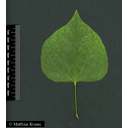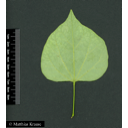Useful information about the taxon (species, subspecies, variety...)
Cercis canadensis L. 1753
Fabaceae (Leguminosae, Papilionaceae)
(APG IV)eastern redbud, redbud
Akzessionnummer: SYS-G-162-1756
Pflanzjahr: 0
Taxon concept: The Plant List (2014), version 1.1
Distribution: Canada: Ontario; eastern United States; Mexico
Cercis canadensis L. - Accepted: Cercis canadensis L. bei Zander 2008; Familie: Fabaceae (Leguminosae, Papilionaceae) (Zander 2008)Cercis canadensis L. - Accepted: Cercis canadensis L. bei The Plant List (2014), version 1.1; Familie: Fabaceae (Leguminosae, Papilionaceae) (APG III)
- Flowers
- hermaphrodite flowers; showy, pink flowers
- Flower ecology
- insect-pollinated (entomophilous) (bees)
- Life form
- tree or shrub
- Foliage persistence
- deciduous
- Fruits
- fruit is a pea-like legume
- Fruit ecology
- animal-dispersed (zoochorous) (birds)
- Soil conditions
- predominantly on alkaline or calcareous soils
- Root type
- taproot
- Natural occurrence (habitat)
- oak forests, forest edges, midstory layer of woodlands (with flowering dogwood); Ashe juniper (Juniperus ashei) habitats; exposed limestone cliffs, disturbed habitats on cutover or windthrown areas
- Vegetation typ and synecology (plant community)
- temperate, mixed mesophytic broad-leaved deciduous forests and mixed forests
- Constraints according radiation (light)
- moderately shade tolerant
- Chemical characters
- seeds contain linolenic, alpha-linolenic, oleic and palmitic acid
- Usage
- bark of young shoots is used in basket making; flowers can be used as a condiment; extract from the inner bark acts highly astringent and is used in the treatment of diarrhoea and dysentery and serves as a febrifuge; ornamental tree in landscaping
Erhardt, W., Götz, E., Bödeker, N. & Seybold, S. (2008): Der große Zander. Enzyklopädie der Pflanzennamen. Band 2. Arten und Sorten. Eugen Ulmer KG, Stuttgart (Hohenheim), 18. Aufl., 2103 S.; Global Biodiversity Information Facilty (GBIF). Online Publication: www.gbif.org; The International Plant Names Index (2009). Published on the Internet http://www.ipni.org; Courtesy to IPNI, 2009. Exported from IPNI at date: 2009-09-22 20:17:51;
Diese Webseite verwendet Google Maps, um Karten und Standorte von Pflanzen in den Hohenheimer Gärten anzuzeigen. Dadurch werden unter Umständen Daten an Google weitergeleitet, was mit einer Verarbeitung Ihrer personenbezogenen Daten verbunden sein kann. Die Datenschutzerklärung von Google finden Sie hier: Datenschutzerklärung von Google


